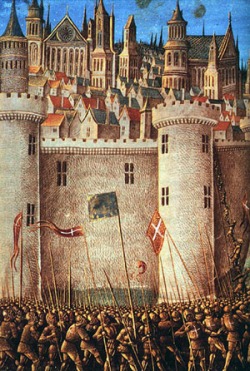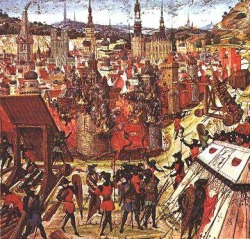Crusades
Facts/Causes:

The Crusades were a series of religiously sanctioned military campaigns carried out by the Franks of France and the Holy Roman Empire in order to recapture Jerusalem, the Holy Land, from Muslim control. The Crusades were launched in response to the call for help from the Byzantine emperor Alexios I's appeal to Pope Urban II for mercenaries to help him resist Muslim advances of the Ottoman Empire into territory of the Byzantine Empire. The Christians siege the Jerusalem and set up a kingdom there.Overall, nine Crusades were carried out. The Second Crusade (1147-1149) were waged in response to the recapture of Jerusalem by the Muslims. After the Second Crusade, Saladin, Sultan of Egypt, conquered Jerusalem after nearly a century under Christian rule. This sparked the Third Crusade (1187-1192). Pope Gregory VII was the one who sent the Crusade with Philip II of France, Richard I of England (aka Richard the Lionheart), and Frederick I of the Holy Roman Empire. However, this Crusade also failed, with Jerusalem under Muslim control. The Fourth Crusade (1202-1204) was planned to capture Jerusalem through Egypt. Instead, the Crusaders went to sack Constantinople in an attempt to place a Byzantine exile on the throne without fighting any Muslims. the five remaining Crusades weren't as famous. The Sixth Crusade was characterized by the peace treaty between Frederick II of the Holy Roman Empire and Al-Kamil of Egypt. With this way, the Christians were able to rule most of the Jerusalem for 10 years. In 1244, the Muslims regained control of the city after being unhappy with Al-Kamil's decision. The Seventh, Eighth, and Ninth Crusades were characterized by the wars with Egypt and Syrian, started by Louis IX of France.
Effects

The Crusades were fought for about nearly 200 years, from 1095 to 1291. As a result, a very large amount of life were lost. However, the Crusades had an enormous influence on Europe. A centralized bureaucracies was developed and king's power increased. Muslims and Christians exchanged knowledge. Trade increased tremendously. Increased trade between Europe and Asia brought many new things to Europe. But the persecution of Jews became more and more cruel, and tension between Christians and Muslims increased.


